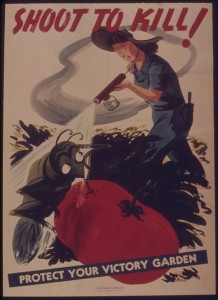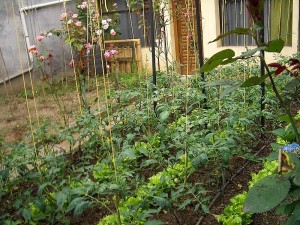Recently I’ve run across a few online discussions and blog posts asserting that vegetarianism and veganism (abbreviated as “veg*nism” from here on out) are the proper dietary choices for pagans and other spiritual people. The arguments for this have ranged from “meat is icky and does icky things to your energy” to “such and such culture is/was primarily veg*n so we should be too” and, of course, “no TRUE pagan (Scottish or otherwise) would ever bring harm to another living being” (forgetting, of course, that animals are only one of several kingdoms of living being). I’m not going to link to any of these discussions because I don’t want people to go start arguments there; I think that sort of brigading is a form of harassment and an ineffective way of getting one’s point across.
On that note, before we go any further, I want to speak to the sometimes thoroughly aggressive and unnecessarily hateful speech and behavior that I’ve seen a small portion of people use in these debates over the years. If you are an omnivore, pagan or otherwise, it is not okay for someone to scream at you that you’re a murderer because you eat meat. It is not okay for someone to say “Ewwwwww, you eat meat/drink milk/eat eggs? That’s so gross it makes me want to vomit!” or “You’re an evil bitch/bastard who’s going to burn in hell for hurting poor little animals!” It is not okay for someone to tell you they wish someone would kill you and cut up your body and cook it, or that they hope you die of a heart attack from eating meat. It is not okay for someone to call together a bunch of their friends to leave hateful messages on your Facebook profile or fill up your inbox with the same in a harassment brigade. That shit’s just not okay.

Now that we’ve established some ground rules, I want to address some reasons why it’s okay for you to be an omnivore if that’s your choice. These are talking points you can draw on if someone ever comes in swinging at you for your diet; they’re not meant as bludgeoning objects to try and convince someone that their veg*nism is wrong for them.
Your Body, Your Diet
Bodily autonomy is a basic human right. Regardless of how you may feel about the autonomy of other living beings, almost all of us can agree that each human being’s right to their own body should be inviolate, and the violation of bodily autonomy is at the root of some of the most serious crimes and human rights crises. That means that you get to choose what you eat (finances and availability allowing, of course), no matter what anyone else says.
It also means you have the right to look out for what’s best for your body. Some of us simply don’t thrive well on even a well-balanced veg*n diet, and if that’s the case for you you don’t have to run around sick and malnourished because someone else yelled at you for not eating the way they think you should. That being said, it’s also a good idea to be aware of what you’re eating and the effects it may be having on your body. My partner and I have both been eating less meat (especially not-fish meat) because we both have familial health risks that could be aggravated by too much meat consumption, and we both love good salads anyway. It’s still your prerogative if you want to live on Denny’s ham and cheese omelets and soda (even when other things are readily available to you and within your means), and part of respecting bodily autonomy means accepting that people are going to eat what they will no matter what anyone else thinks.
Spirituality and Subjective Projection
From a more particularly pagan angle, I’ve seen numerous claims that a veg*n diet is better for spiritual practices. The reasons include everything from the claim meat is harder to digest, requiring more bloodflow to the stomach and therefore less to the brain, to the concept that meat clutters up your energy/aura/etc. The part about digestion is true–cooking meat, marinating it (particularly in an acidic marinade) and even pureeing it can make it easier to digest, but it still take more effort than, say, cherries or lettuce. If you’re an omnivore and want to amp up the bloodflow to your brain for the purposes of a particular meditation or retreat, then a temporary veg*n diet can help.

Given the choice between spirit and science, I’m choosing science every time; spirituality is not meant to be a replacement for professional medical care. That means that since my doctor, who has seen me for years and has been tracking my health with her years of experience and her knowledge of the most up to date research, suggests I stick to omnivorism, that’s going to trump someone without credentials telling me that they think my aura looks muddy because I had bacon this morning.
Just Because We Don’t Have Catchy Slogans Doesn’t Mean We’re Wrong
One of the most frustrating things for me is when slogans like “MEAT IS MURDER!” and “EAT BEANS, NOT BEINGS” are bandied about as though having a catch phrase is all it takes to make you right. Like a sports team’s traditional cheer, these sound bites serve to bind together activists in a common cause with a quick, easy to remember distillation of their message. Unfortunately, just like sports fanatics who stalwartly stick by their team no matter what, the people chanting these things sometimes don’t consider the possibility someone else could have a perfectly valid disagreement. Moreover, these slogans also provide activists with a way to shut down any possible conversation. An omnivore could say “Hey, I choose to eat free-range meat because…” and all the other person has to do is scream “IT’S STILL MURDER, YOU MURDERER! MURDER!”
Here on the omnivore end of the spectrum, we don’t really have slogans, beyond those created by marketing boards. I mean, “PORK! THE OTHER WHITE MEAT!” isn’t really an inspiring rallying cry. And sometimes we don’t really know what to say when someone comes at us, ready to beat us into the ground with a guilt trip. It takes a lot longer to explain why The Compassionate Hunter’s Guidebook spoke to you than it does for someone else to say “YOU KILLED BAMBI!” There’s very little room there for critical thinking.
Why is critical thinking important? Because there’s bad information on both sides of the debate, and critical thinking is a good opportunity to question and double-check this information. One of the discussions I mentioned in the very first paragraph stated that over half of greenhouse gas production is specifically from agriculture; however, the EPA reports that only 10% are from all combined agriculture, livestock and otherwise. Conversely, there are people who honestly think non-human mammals aren’t able to feel pain–yes, there are still those who subscribe to Descartes’ concept of mechanistic physiology in which animals only respond to stimuli because they’re meaty machines, never mind all the modern research to the contrary. And when someone questions either of these assertions, the people who hold to them are likely to just latch on more tightly.
Critical thinking is scary because it can show the flaws and cracks in one’s own beliefs and posits the idea that maybe the other person does have a point. Slogans, on the other hand, often present something as universally desirable for everyone, a much safer but more inaccurate proposition. Even I can see the severe limitations of “Milk: It Does a Body Good”, starting with the significant number of lactose-intolerant and dairy-allergic people out there. This brings me to my final talking point…
We Face Very Complex Problems With More Than One Potential Solution

For some people, the answer to this is veg*nism–fewer animals die, less grain is required for animal feed, and so forth. It’s a good answer for many. But it’s not the answer that works for me, not just because of my body’s need for animal proteins, but also because I choose to focus my efforts at a greener life a little differently. I buy most of my meat from a free-range ranch a few hours outside of Portland; they have a booth at nearby farmer’s market every weekend. I’ve toured their ranch, too; the animals are entirely pasture-fed, with no grain finish. Those pastures also support a diversity of wildlife and plants, and the soil is nourished by the manure of buffalo, heritage turkeys, and other livestock. I have my plot at the community garden and my collection of pots on my tiny balcony; it’s not enough to feed both me and my partner, but it’s a very good supplement, and we can make up the difference with organic produce (especially during the summer when the farmer’s markets are full to overflowing with choices). And there are fishmongers at the same markets who drove just a couple of hours from the coast–or, in the case of salmon, nearby rivers–with small-scale, sustainable seafood. All these things came locally, cutting down on carbon pollution compared to conventional alternatives that were flown in from out of the country. And the meat I buy is a damned sight better in my mind than a Morningstar Farms veggie burger, produced by Kellogg’s from non-organic soy and other ingredients.
But this is my solution, as someone who is an obligate omnivore, who happens to live in a very food-friendly city, and who has the financial means to pay a little more for organic at the store and the time to tend to a small garden. I would never dream of presenting it as the One True Solution to carbon pollution, factory farming, and dead zones in the ocean. When I write about my adventures in gardening, or share recipes on Tumblr, I’m not doing it to tell people that they should do things my way. Instead, I’m leaving my experiences out there as examples for others to consider along with other information, and to encourage those who have been thinking about trying out the things I’m doing. That’s as far as it goes.
And you know what? I’m fine with being an omnivore. I don’t run around wearing an “OMNIVORE PRIDE!” shirt, because I don’t think diet is something to particularly be proud of or ashamed of either way. But I have carefully considered my options with research and critical thinking and found a solution that both works for my needs, and sits well within my eco-conscious conscience. I’ll always question it, too, as new information comes out and as new options arise, because fundamentalism of any sort sucks. (You can insert your own end comment here about omnivory and sacred cows.)





